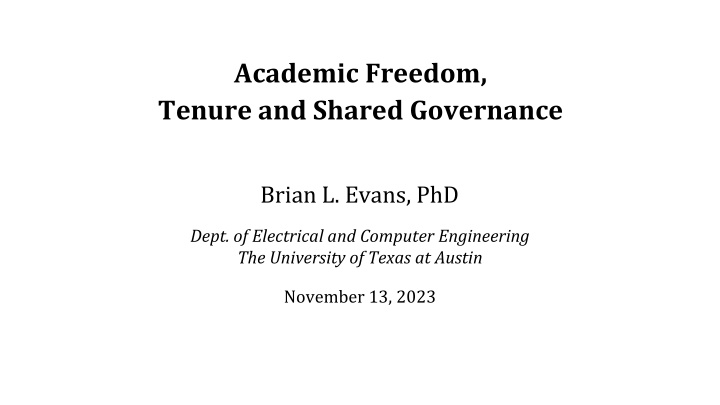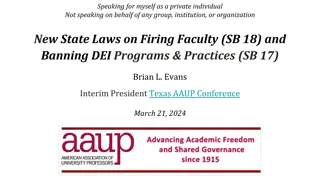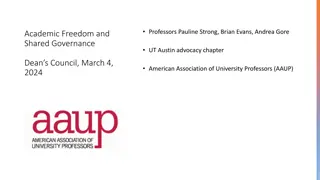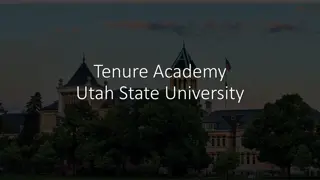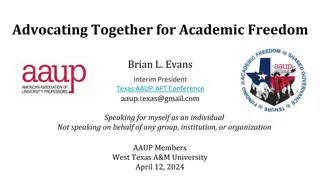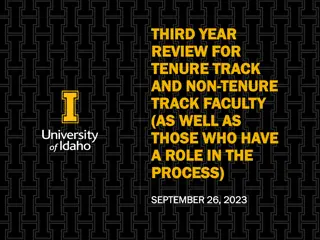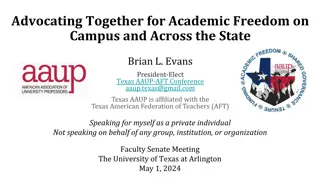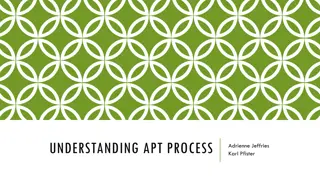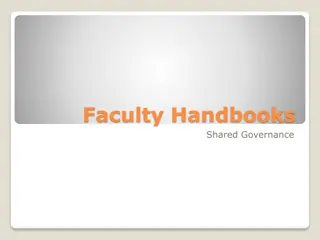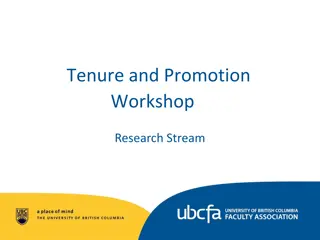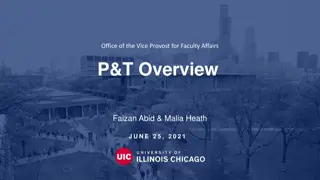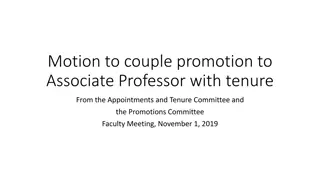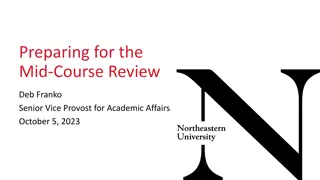Importance of Academic Freedom, Tenure, and Shared Governance in Higher Education
Academic freedom, tenure, and shared governance are crucial in higher education for fostering open inquiry, protecting faculty rights, and ensuring institutional integrity. Organizations like the American Association of University Professors (AAUP) advocate for these principles to uphold faculty autonomy, free expression, and a robust academic environment. The 1940 Joint Statement emphasizes the significance of these principles in promoting research, innovation, and learning. Tenure provides stability for faculty to pursue knowledge without external pressure, while shared governance facilitates inclusive decision-making processes.
Download Presentation

Please find below an Image/Link to download the presentation.
The content on the website is provided AS IS for your information and personal use only. It may not be sold, licensed, or shared on other websites without obtaining consent from the author.If you encounter any issues during the download, it is possible that the publisher has removed the file from their server.
You are allowed to download the files provided on this website for personal or commercial use, subject to the condition that they are used lawfully. All files are the property of their respective owners.
The content on the website is provided AS IS for your information and personal use only. It may not be sold, licensed, or shared on other websites without obtaining consent from the author.
E N D
Presentation Transcript
Academic Freedom, Tenure and Shared Governance Brian L. Evans, PhD Dept. of Electrical and Computer Engineering The University of Texas at Austin November 13, 2023
American Association of University Professors AAUP founded in 1915 by faculty and has 45,000 members AAUP has been organizing faculty on campuses, statewide, and nationally for advocacy of higher ed issues including Academic Freedom Tenure Shared Governance AAUP affiliated with the American Federation of Teachers (1.7M members including 148,000 professors) on Aug. 1, 2022
1940 Joint AAUP/AAC&U Statement of Principles on Academic Freedom & Tenure The 860+ institutions in American Association of Colleges & Universities, including UT Austin, have adopted these principles Academic Freedom for faculty consists of interrelated elements: freedom to discuss all relevant matters in the classroom freedom to explore all avenues of scholarship, research, and creative expression and to publish the results of such work freedom from institutional censorship or discipline when speaking or writing as participants in the governance of an educational institution freedom from institutional censorship when speaking or writing as a citizen Safeguards include tenure, due process, shared governance 1940 Statement: https://www.aaup.org/report/1940-statement-principles-academic-freedom-and-tenure
1940 Joint AAUP/AAC&U Statement of Principles on Academic Freedom & Tenure Free inquiry, free expression, and open dissent are critical for student learning and the advancement of knowledge Tenure provides the conditions for faculty to pursue research and innovation and draw evidence-based conclusions free from corporate or political pressure Tenure is an indefinite appointment terminated only for cause or extraordinary circumstances such as financial exigency All full-time faculty members, regardless of rank, are to be considered eligible for tenure 1940 Statement: https://www.aaup.org/report/1940-statement-principles-academic-freedom-and-tenure
1966 Joint AAUP/ACE/AGB Statement on Government of Colleges and Universities Adopted by the 1500+ institutions in American Council on Education (ACE) including UT Austin and 1300+ members of Assoc. Gov. Boards of Universities & Colleges including UT System Faculty have primary decision-making authority in Curriculum, subject matter, and methods of instruction Those aspects of student life which relate to educational process Matters related to faculty status appointments, reappointments, decisions not to reappoint, promotions, granting of tenure, and dismissal President should exercise adversely only in exceptional circumstances, and for reasons communicated to the faculty & receive faculty feedback Faculty have authority in financial exigency and program closures 1966 Joint Statement, https://www.aaup.org/report/statement-government-colleges-and-universities
1966 Joint AAUP/ACE/AGB Statement on Government of Colleges and Universities President shares responsibility in Definition and attainment of goals Administrative action Communications to link components of academic community President provides institutional leadership Innovate, initiate, and persuade others to work toward goals Utilize judgments of the faculty and outside competent scholars Ensure standards and procedures conform to policy established by the board and standards of sound academic practice Manage and create resources President represents institution to public 1966 Joint Statement, https://www.aaup.org/report/statement-government-colleges-and-universities
1966 Joint AAUP/ACE/AGB Statement on Government of Colleges and Universities Maintains a general overview of the institution Entrusts conduct of administration to administrative officers Entrusts conduct of teaching and research to the faculty Publishes codified statements defining policies and procedures Provides long-term resource planning and oversees endowment Obtains capital and operating funds Supports institution when ignorance or ill will threatens any part In grave crises it will be expected to serve as a champion. Governing Board Roles 1966 Joint Statement, https://www.aaup.org/report/statement-government-colleges-and-universities
Faculty Governance in UT Austin Departments Graduate Studies Committee: graduate curriculum, graduate degree requirements, and graduate admissions. All tenured/tenure-track (TTT) faculty in dept./program and invited UT TTT faculty. Budget Council / Executive Committee: faculty hiring, promotion, tenure, annual, post-tenure, and mid-probationary review. By default, Budget Council consists of all full professors, and if there is none, then all Associate Professors. Any modifications to the default structure must be voted on every three years by the full professors. General Faculty Committee: undergraduate curriculum, student life and activities, and honors. All TTT faculty, and all NTT faculty with 50% or more appt. for four consecutive fall/spring semesters, are eligible to vote.
Graduate Studies Committee (GSC) The shared governance model for a graduate program consists of three officers (GSC Chair, Graduate Adviser, and Dept. Chair / Director) and the GSC members. Graduate Studies Committees "Each graduate studies committee shall have at least five members and shall elect its own chair. The term of the graduate studies committee chair is normally three years, but may be renewed." https://secure2.compliancebridge.com/utexas/public/getdoc.php?file=9-1240
